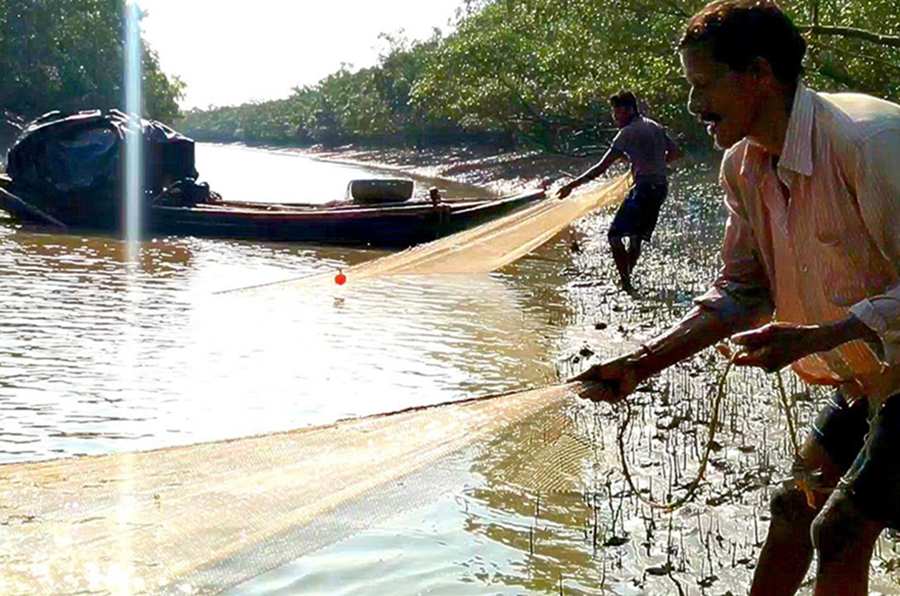
Published :
Updated :

The enchanting beauty of the Sundarbans mangrove forest hides a harsh reality. This UNESCO World Heritage site, spanning the delta of the Ganges, Brahmaputra, and Meghna rivers, is not only a treasure trove of biodiversity but also the lifeline of millions. A recent study by BRAC Microfinance sheds light on the difficulties faced by the fishermen of Sundarbans, where 95% of them are caught in debt-trap. The need for urgent intervention is apparent, not just for the well-being of these fishermen but for the preservation of this natural wonder.
The Sundarbans, intersected by tidal waterways and salt-tolerant mangrove forests, is home to over 200 fish species and 30 crustacean species according to IUCN and World Bank. Over two million individuals rely on the Sundarbans for their direct or indirect subsistence, with a significant portion of the impoverished and resource-dependent populations depending heavily on fishing activities. However, the ban on collecting forest resources has left the fishermen unemployed for half the year, forcing them into cycles of debt. In the heart of the Sundarbans, where the tranquil waters meet the dense mangrove forests, the fishermen of Bangladesh find themselves entangled in a web of financial hardship. From the study of BRAC Microfinance it is found that approximately 90% of these fishermen resort to borrowing from money lenders, the likes of 'Mohajon' and 'Dadon', to secure loans necessary for their fishing preparations - acquiring food, fuel, boats, and nets before embarking on their lengthy journeys into the rivers. Shockingly, only a meager 4% among them have the means to cover these essential expenses from their own capital. Adding to their financial woes, a staggering 87% of these fishermen are indebted to multiple microfinance organizations, further exacerbating their economic burden.
The situation takes a grim turn due to the government's ban on collecting forest resources from the sanctuary areas, a move aimed at preserving the biodiversity of the region, including its precious wildlife and trees. Consequently, these fishermen remain unemployed for nearly half of the year, leaving them with no source of income. To make ends meet during these difficult times, they are compelled to take loans not only from money lenders but also from various non-governmental organisations. Trapped in a vicious cycle of debt, they are forced to acquire additional loans simply to repay existing ones, creating an insurmountable burden.
In light of their dire circumstances, these fishermen have implored the government to create alternative employment opportunities beyond fishing. They seek viable options to sustain their livelihoods during these crisis periods, hoping for a chance to break free from the shackles of debt that bind them. Jahangir, a fisherman from the Sunderbans, exemplifies the struggle faced by his community. He, like many others, is a regular borrower from multiple microfinance organizations. When asked about the best among these institutions, he emphasized the importance of those that offer flexible repayment schedules, acknowledging the unpredictable nature of their income.
Amidst these challenges, the fishermens' hopes have been dashed repeatedly. Despite receiving official identity cards from the government, intended to provide incentives, individuals like Jahir and Billal have yet to see any tangible benefits. Their sorrow is compounded by the fact that the quality fish they catch are exported to different countries under the name of India, leaving them bereft of the opportunity to sell their produce in their own country. This situation highlights the urgent need for Bangladesh to promote and sell its fish domestically, supporting the local economy and providing a lifeline to these struggling fishermen.
In the midst of these adversities, the fishermen of the Sundarbans continue their arduous journey, their cries for support echoing through the mangrove forests. Their plea is not just for themselves but for the preservation of their way of life and the rich biodiversity that surrounds them. It is a call for help, a plea for understanding, and a request for equitable opportunities that can emancipate them from the cycles of debt, enabling them to thrive in harmony with the natural wonders that define their existence.
To rescue these fishermen from the depths of poverty, several strategies must be employed:
(a) Diversification of Livelihoods: Introduce skill development programs to empower fishermen with alternative professions during off-fishing seasons. Training in agriculture, handicrafts, and small-scale entrepreneurship can provide sustainable income sources, breaking the cycle of debt.
(b) Transparent Government Support: Ensure transparent and efficient distribution of incentives promised by the government. Identity cards should translate into tangible benefits, providing rice and financial aid directly to the fishermen, bridging the gap between promises and reality.
(c) Local Fish Trade Promotion: Encourage the sale of local fish within Bangladesh. Establishing local markets and empowering fishermen to sell their catch directly to consumers will boost the local economy and increase their income.
(d) Regulation and Fair Trade Practices: Implement regulations to prevent the export of quality fish under foreign names. By promoting fair trade practices, Bangladesh can capitalize on its own resources, ensuring that the benefits remain within the country, benefiting the local communities.
(e) Strengthening Microfinance Institutions: Collaborate with microfinance institutions like BRAC MF to provide tailored financial products with flexible repayment schedules. Offering financial literacy programs can empower fishermen to manage their finances effectively, breaking free from the vicious cycle of loans.
In the heart of the Sundarbans, where nature's grandeur meets human struggle, lies an opportunity for change. By diversifying livelihoods, ensuring transparent government support, promoting local fish trade, regulating exports, and strengthening microfinance institutions, we can empower the fishermen of Sundarbans, fostering prosperity and securing the future of this ecological wonder. It is time to transform their cries for help into a resounding anthem of progress, resilience, and hope.


 For all latest news, follow The Financial Express Google News channel.
For all latest news, follow The Financial Express Google News channel.